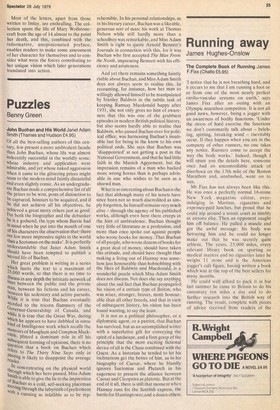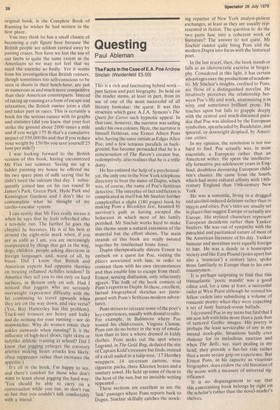Running away
James Hughes-Onslow
The Complete Book of Running James F.Fixx (Chatto £5.95) 'I notice that he is not breathing hard, and it occurs to me that I am running a foot or so from one of the most nearly perfect cardio-vascular systems on earth,' says James Fixx after an outing with an Olympic marathon competitor. It is not all good news, however, being a jogger with an awareness of bodily functions. 'Under the stress of hard exercise the functions we don't customarily talk about — belching, spitting, breaking wind — inevitably occur. If they happen when you are in the company of other runners, no one takes any notice. Runners come to accept the way the body works.' Indeed, though I will spare you the details here, someone once had an uncontrollable attack of diarrhoea on the 13th mile of the Boston Marathon and, unabashed, went on to win.
Mr Fixx has not always been like this. He was once a perfectly normal 16-stone New York magazine editor, overindulging in Martinis, cigarettes and expenses-paid lunches, but proud that he could nip around a tennis court as nimbly as anyone else. Then an opponent caught him off balance. He pulled a muscle and got the awful message: his body was betraying him and he could no longer make out that he was secretly quite athletic. The years, 25,000 miles, every relevant library book on sporting or medical matters and no cigarettes later he weighs 11 stone and is the American jogger's cult figure, having written a book which was at the top of the best sellers for many months.
He could well afford to pack it in but last summer he came to Britain to do his customary ten miles a day and to do further research into the British way of running. The result, complete with pieces of advice received from readers of the original book, is the Complete Book of Running he wishes he had written in the first place.
You may think he has a small chance of becoming a cult figure here because the British people are seldom carried away by passing crazes. Nor have we lost the use of our limbs to quite the same extent as the Americans so we may not feel that we need the exercise so badly. Yet it seems from his investigation that British runners, though sometimes too self-conscious to be seen in shorts in their lunch-hour, are just as numerous as and much more competitive than their American counterparts. Instead of taking up running a s a form of escape and relaxation, the British runner joins a club and takes part in races. This is certainly a book for the serious runner with its graphs and statistics (did you know that your feet strike the ground about 2000 times a mile and if you weigh 175 lb that's a cumulative impact of 350,000 lbs and that if you reduce your weight by 150 lbs you save yourself 25 tons per mile?) was looking forward to the British version of this book, having encountered Mr Fixx last summer. Seeing me up a ladder painting my house he offered me his two spare pints of milk saying that he didn't need the calcium that day. I subsequently joined him on his run round St James's Park, Green Park, Hyde Park and Kensington Gardens and I don't like to contemplate what he thought of my cardio-vascular system.
1 can testify that Mr Fixx really means it when he says that he feels refreshed after a ten-mile run. The further he goes the chirpier he becomes. He is at his best at around the eight-mile mark when, if you are as unfit as I am, you are increasingly exasperated by things that get in the way, dogs, children, people asking directions in foreign languages, and, worst of all, by buses. Did I know that British and American experts had opposite theories on treating inflamed Achilles tendons? In America they tell you to run only on hard surfaces, in Britain only on soft. Had I noticed that joggers who are seriously overweight experience difficulty with the fat continuing to travel upwards when they are on the way down, and vice versa? (Yes, Roy Hattersley has this problem). Track-suit trousers are heavy and bulky and do nothing for your running — nor do stopwatches. Why do women rotate their ankles outwards when running? Is it the influence of high-heel shoes, tight skirts or ladylike athletic training at school? Did I know that jogging enlarges the coronary arteries making heart attacks less likely, often suppresses rather than increases the appetite.) It's all in the book, I'm happy to see, and there's comfort for those who don't want to learn about jogging the hard way: 'You should be able to carry on a conversation while you run, so don't run so fast that you couldn't talk comfortably with a friend.'







































 Previous page
Previous page